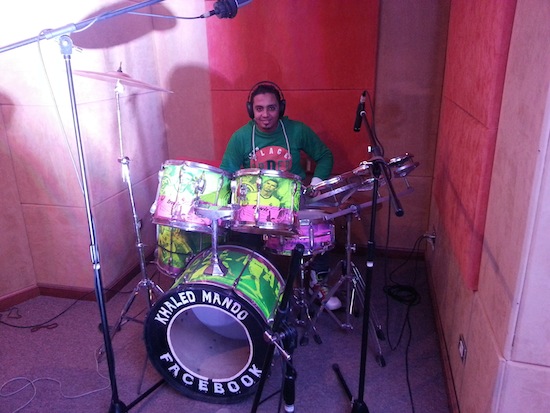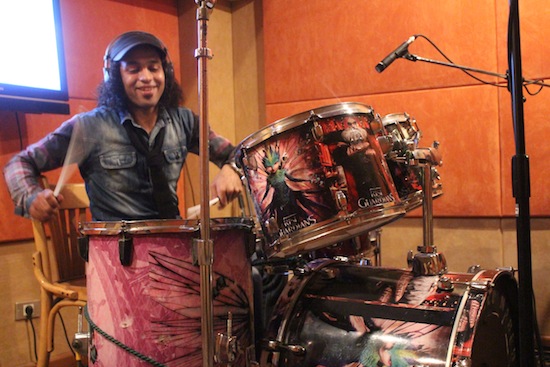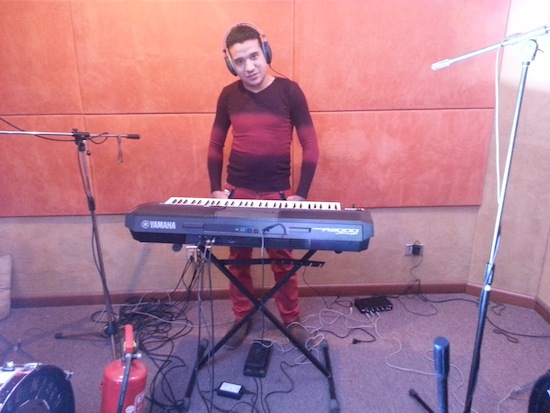All studio shots taken by Hicham Chadly at 100Copies Cairo
A year and a half ago, a handful of YouTube clips of a young keyboard player, flanked on either side by a drummer, sparked off the Quietus’ intense fascination with the many new forms of underground music currently emerging from Egypt. At first we were under the impression – due to a misleading documentary and some mislabelled YouTubes – that Islam Chipsy was a proponent of what was becoming known as electro chaabi. Through judicious use of cut & paste and Google Translate on the Arabic script under Chipsy’s YouTube clips, friend of the Quietus and electro chaabi DJ Joost Heijthuijsen uncovered scores of rappers, producers and DJs operating out of working class suburbs of cities such as Cairo and Alexandria, far outside of the mainstream Egyptian music industry. This style of music, we learned, was also known as mahraganat – Egyptian for ‘festival’ – which made sense, as the music seemed to flourish live at weddings, with the plentiful YouTube clips acting as adverts for the services of various musicians.
While very exciting, we began to realise however that none of these other artists – such as Sadat, Figo and Alaa Fifty Cent – really had that much in common with Chipsy. These other true electro chaabi artists were using cracked computer softwares like Logic, Fruity Loops and Auto-Tune, creating a revolutionary form of electronic dance music that was more closely related to grime and dancehall in texture and rhythm than it was to the preternaturally gifted keyboard player. Chipsy was obviously a classically trained Arabic musician with some serious chops: you could imagine him quite easily entertaining people from all different strata of Egyptian society, depending on the style he was playing. It would be true to say that they are all part of a ‘new wave’ of chaabi – a very working class type of Egyptian music whose main function is as musical entertainment at weddings – but other than that, they’re actually quite dissimilar.
On visiting Egypt last spring, Joost and I got to witness first hand just how separate the worlds of electro chaabi and Islam Chipsy are. On the Tuesday night we were guests at the giant (rave-by-any-other-name) engagement party thrown for electro chaabi star Sadat in the working class, desert-edge township of El Salam City. It was a glorious riot of a sense-overloading hoe-down, whose banging EDM (Egyptian Dance Music) was driven forcefully home by scores of MCs, immense volume, overpowering lighting and chaotic home made pyrotechnics. The following day we met Chipsy in the altogether more relaxed, downtown Cairo nightclub The Markez, which featured traditional Egyptian musical entertainment for the benefit of members from all walks of society, and visitors from Saudi Arabia and the United Arab Emirates. Even though Chipsy’s "own style" is too radical for the nightclubs, the contrast still couldn’t have been clearer.
Writing on the Quietus recently, Joost eloquently summed up the differences between the new wave chaabi subgenres: "First of all, Islam Chipsy does not want to be associated with the mahraganat movement. He comes from the Imbaba neighborhood, which is in the heart of Cairo. The mahraganat sound … comes from the fringes, from El Salaam City. In Western terms you could say that Islam Chipsy is a modernist artist who works in a linear tradition. By first mastering the tradition, he was then free to re-invent this tradition as it related to keyboard playing. It’s pure, violent virtuosity. Traditional piano players use all their fingers to play a chord. House music revolutionised this, by allowing the producer to use only one finger. Chipsy introduced a new approach: he fires tone clusters with his fists, palms and edges of his hands all over the keyboard, and slamming down the keys, but still in a virtuosic way … Mahraganat seems to belong to a more post-modern approach. It utilises satire and pastiche in the lyrics, and relies on sampling from other sources and the use of cheap cracked software like FruityLoops. The style is much more lo-fi, more anti-establishment. (It is merely the production or recording of Chipsy that is lo-fi.)"
Since our visit, when the following interview took place, Chipsy’s band EEK have had their first album released on the Egyptian/Algerian label Nashazphone. Live At The Cairo High Cinema Institute is a nerve-frying trip headlong into the Islam Chipsy/EEK live experience. It is a red raw recording, as lo-fi and intense as they come, and in sonic terms it feels more like Mainliner’s Mellow Out or some ultra-rare and sought after black metal demo cassette than a document of Egyptian virtuosity. Furthermore, when removed from the context of the YouTube clips, the actual music will probably initially remind some Western listeners of a cassette recording of Bang Face or a Scotch Egg DJ set.
This amazing gig was recorded by Sun City Girl and adopted son of Cairo Alan Bishop, with Hicham Chadly and Ahmed Farrag. His sleeve notes adorn the back cover of the album in Arabic, but just for you, here’s what he has to say in English about his experience of watching Chipsy live: "The sound was raw and distorted, the volume was deafening, and the energy was high. 30 minutes into the set, the trio pulled out blindfolds and put them on, only to continue their virtuosic performance without missing a beat, synced to the max, playing forwards, backwards, sideways psychedelic noise and showmanship projected through the distortion of a jet engine taking flight for some unknown location in the distant future of Shaabi sound. They were smiling and are very nice cats indeed, but when the PA system is blazing with their audio explosions, you best get up off your ass to dance or get the hell out of the way!"
One can only concur.
I spoke to Chipsy in a booth at the Markez nightclub on April 24, 2013, with Hicham Chadly of Nashazphone translating.

Can you tell me a bit about yourself, where you were born and where you grew up?
Islam Chipsy: My name is Islam Said, also known as Islam Chipsy, I’m 28 years old. I was born in Imbaba, north of Giza. I have two brothers who are also into music, they are both singers, one of them used to be a keyboard player but he’s a singer now. I’ve been playing keyboards for 16 years, and playing my new style for eight years, and people have known about it for five years in Egypt.
Who taught you, and what style of music did you study initially when you were a boy?
IC: [My] brother taught [me] the standards, how to play Arab classical music. But I decided later to perfect this style, to explore it and to explode the limits. [I] learned the theory in this way as well, but decided to push onwards [myself]. I also used to listen pop music around this time when I was growing up.
About one and a half years ago, Joe Bangina from Cargo Records played me a YouTube of you playing live, and it’s because of that YouTube clip that I’ve come to Cairo. Do you find that outside of Cairo, word about your new style is spreading via YouTube?
IC: Yes. People come from Alexandria to see me play.
How do older people react when they hear you playing your new style?
IC: Generally speaking the reaction was the same from everyone at first. They don’t think much of it, until they slowly realise that there is something behind it. They realise that there is music theory behind it.
How did the new style develop? When did you start playing with the two drummers?
IC: I’ve been playing with the two drummers for four years. When the style first started developing it was at a wedding of a friend of mine, and I started to improvise, and I realised that the crowd were really reacting to what I was doing, so I started to explore this even more.
Do you find the crazier the crowd go, the more you tend to go for it?
IC: 80% yes! [laughs] 80%, and the more people there are in the crowd, the more power there is in the set.
Can you tell me what the main differences are between your own new wave synth style and the more traditional stuff you do in clubs?
IC: I do four main styles. I do old club classics here [Club Markez] with a female singer, and the songs are heavy on melody. This is a laboratory for me to experiment with new techniques and styles. I have a production and arrangement studio. I play as a session man for singers. The third one is weddings, where I set myself up with the DJ or the band for the wedding. And the fourth is what you know – EEK. I have a phone for each style! [laughs]
Is there much competition in Cairo to be the best keyboard player or the most renowned keyboard player?
IC: Not really. There was another guy who was also called Islam who was copying my style – literally. But without any real virtuosity. There is no real competition. But it isn’t about talent in Cairo, it’s about fame…
How famous are you in Cairo?
[there’s a brief discussion between Hicham and Islam who is laughing and shaking his head]
Hicham Chadly: If it’s OK I’m going to answer this for him, because he won’t, because he’s very modest. Among young people Islam Chipsy is the best. He’s the wildest.

Can you tell me about the songs that EEK perform?
IC: No, it’s all improv. It’s all improvised, so no song titles.
What is your daily routine as a musician like?
IC: Usually the day starts at 6pm and ends at 8am. That time is split between rehearsing, working, recording and practice and is seven days a week.
I know you play apolitical music, but in the wider scale of things, can I ask how the revolution has affected you, or the way your ply your trade?
IC: Not really. Revolution did not affect the music scene as much as some people want to pretend that it did. Not really. What I’m doing now is simply the logical progression of the music that I’ve been working on for years. The only real difference is that there are fewer policemen around, so the singers are looser; they can sing about what they want. But if we were to release a record, it would have to go through the same state censorship.
If you had to recommend some music to us, what would it be?
IC: I don’t like modern chaabi, but I do like some of the singers. Technically what they do is great. But what I do like is mainstream Egyptian pop. People like Amr Diab. I like some Algerian rai. I listen to hip hop, I love hip hop, I try to take hip hop production and transform it into Egyptian chaabi. I like Shaggy. I hate metal.
HC: He hates metal but he is metal! [laughs] It’s the distortion!
Where do you want to be in five years’ time as an artist? What would be the ideal situation?
IC: Where I’m working is slowly becoming the second best studio in the country for chaabi arrangement and recording, and my hope and dream is to do the same thing on an international level – to hook up with people of a bigger calibre abroad, and to work with them and produce them.
Who are the other two guys in EEK, and where did you meet?
IC: The other two guys are Islam Ta’ta’ and Khaled Mando. We met at weddings six years ago. I found myself playing with each of them, and it was always truly exceptional. For one occasion, I was asked to bring a full orchestra to a wedding (I usually played with DJs), and I thought of inviting Khaled and Islam. The response in the audience was so intense that we thought there was something to be explored and developed, and EEK was basically born out of that.
How much rehearsal does it take for you to get so good at responding to changes in tempo and rhythm?
IC: We never rehearse, it’s all improvised on stage. Khaled and Islam have their own shows with DJs, and I spend all my time between the nightclub and studio work.
What can you tell me about the Cairo High Cinema Institute gig? What is the venue like? How many people were there? How was it recorded?
IC: The Student Union invited us after having seen us at the Geneina Theatre at Azhar Park, where we had just played. The show was open air in front of the main building of the Institute, and the audience was large – I can’t be exact ,but it was in the 500 – 1000 range.
How are the sessions for the new album going? Where are you recording it? When will it be finished? What is it sounding like so far?
IC: The sessions are done. we have enough material for our first studio album, which will also be on Nashazphone. The tracks will be mixed soon. The recording took place at 100Copies Studio in downtown Cairo.
EEK’s Live At The Cairo High Cinema Institute is out now on Nashazphone



